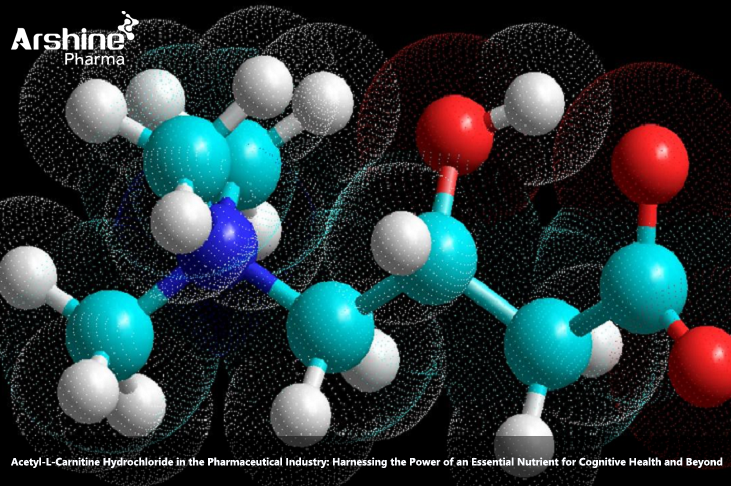
Introduction: In the pharmaceutical industry, the exploration of novel compounds to support cognitive health and address various medical conditions is crucial. Acetyl-L-carnitine hydrochloride (ALCAR HCl), a derivative of the essential nutrient L-carnitine, has gained recognition for its multifaceted applications in the pharmaceutical field. In this article, we will delve into the diverse uses of acetyl-L-carnitine hydrochloride in the pharmaceutical industry, highlighting its therapeutic benefits, mechanisms of action, and potential implications for cognitive health and beyond.
-
Understanding Acetyl-L-Carnitine Hydrochloride: Acetyl-L-carnitine hydrochloride is a modified form of L-carnitine, an amino acid derivative that plays a vital role in energy metabolism and cellular functioning. ALCAR HCl possesses an acetyl group, which enhances its bioavailability and allows for its unique pharmacological actions.
-
Cognitive Health and Neuroprotection: ALCAR HCl has shown promising effects in supporting cognitive function and neuroprotection. It crosses the blood-brain barrier and enters the brain, where it acts as an antioxidant, helps maintain cellular membrane integrity, and enhances energy production within neurons. These mechanisms contribute to the preservation of brain health and the protection of neurons against oxidative stress and age-related cognitive decline.
-
Alzheimer's Disease and Mild Cognitive Impairment: Alzheimer's disease is a neurodegenerative disorder characterized by progressive cognitive decline. ALCAR HCl has demonstrated potential benefits in Alzheimer's disease by promoting the production of acetylcholine, a neurotransmitter involved in memory and cognitive function. Studies have shown that ALCAR HCl supplementation may improve memory, attention, and overall cognitive performance in individuals with Alzheimer's disease and mild cognitive impairment.
-
Neuropathic Pain Management: Neuropathic pain, a chronic pain condition resulting from damage or dysfunction of the nervous system, can significantly impact quality of life. ALCAR HCl has shown promise as an adjunctive therapy for neuropathic pain. It modulates neurotransmitter activity, reduces oxidative stress, and helps restore nerve function, thereby alleviating pain and improving pain tolerance in individuals with neuropathic pain conditions.
-
Depression and Mood Disorders: ALCAR HCl exhibits potential benefits in managing depression and mood disorders. It plays a role in the synthesis and release of neurotransmitters, such as dopamine and serotonin, which are essential for mood regulation. ALCAR HCl supplementation may help enhance mood, alleviate symptoms of depression, and improve overall mental well-being. Further research is warranted to establish its efficacy and optimal dosage in these conditions.
-
Energy Metabolism and Fatigue Reduction: ALCAR HCl is involved in the transport of fatty acids into the mitochondria, where they are utilized for energy production. By enhancing cellular energy metabolism, ALCAR HCl may help reduce fatigue and increase physical and mental stamina. This effect has implications for conditions characterized by fatigue, such as chronic fatigue syndrome and age-related decline in energy levels.
-
Oxidative Stress and Age-Related Cognitive Decline: Oxidative stress plays a significant role in the aging process and age-related cognitive decline. ALCAR HCl acts as an antioxidant, counteracting the damaging effects of free radicals and reducing oxidative stress. By protecting cells and tissues from oxidative damage, ALCAR HCl may help mitigate age-related cognitive decline and support healthy brain aging.
-
Neuroprotection in Neurological Disorders: ALCAR HCl has shown promise in providing neuroprotection in various neurological disorders, including Parkinson's disease, Huntington's disease, and ischemic stroke. It exerts antioxidant effects, enhances energy production, and supports neuronal membrane stability, reducing neuronal damage and improving overall neurological function. Further research is needed to fully understand its therapeutic potential and establish optimal treatment protocols.
-
Weight Management and Metabolic Health: ALCAR HCl has been investigated for its potential role in weight management and metabolic health. It may aid in fat metabolism and help maintain healthy body weight by promoting the utilization of fatty acids for energy production. ALCAR HCl's effects on metabolism have implications for conditions such as obesity, insulin resistance, and metabolic syndrome. However, more research is needed to determine its efficacy and long-term safety in these applications.
-
Side Effects and Precautions: ALCAR HCl is generally well-tolerated, and serious side effects are rare. Mild gastrointestinal symptoms, such as nausea and stomach discomfort, have been reported in some individuals. As with any supplement or medication, it is important to follow recommended dosage guidelines and consult a healthcare professional before initiating ALCAR HCl supplementation, especially for individuals with underlying medical conditions or those taking other medications.
Conclusion: Acetyl-L-carnitine hydrochloride (ALCAR HCl) offers a wide range of potential therapeutic applications in the pharmaceutical industry, particularly in the realm of cognitive health and neuroprotection. Its neuroprotective, antioxidant, and metabolic effects contribute to its multifaceted benefits in Alzheimer's disease, mild cognitive impairment, neuropathic pain, depression, fatigue reduction, and various neurological disorders. ALCAR HCl holds promise as an adjunctive therapy in these conditions, but further research is necessary to establish optimal dosages, treatment protocols, and long-term safety. As the pharmaceutical industry continues to explore innovative approaches to cognitive health and beyond, ALCAR HCl remains a valuable compound with the potential to enhance patient outcomes and improve overall well-being.
